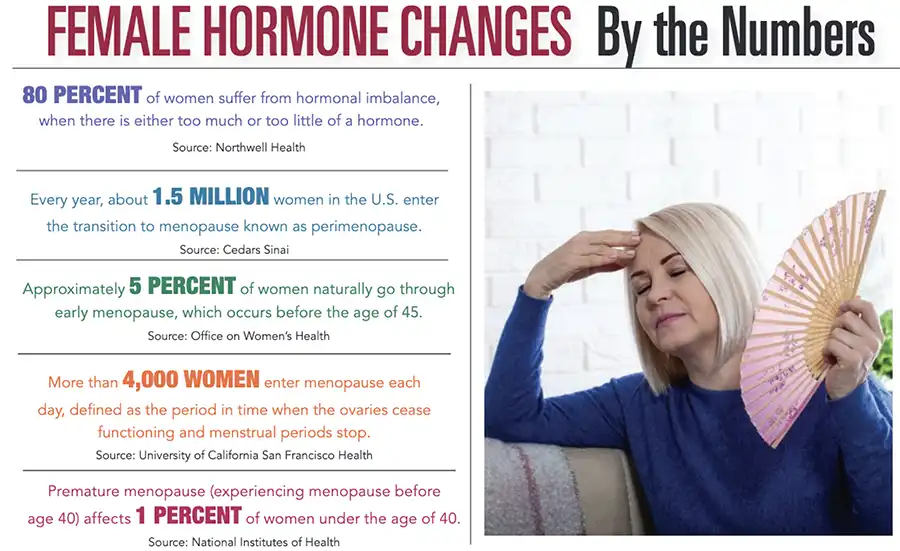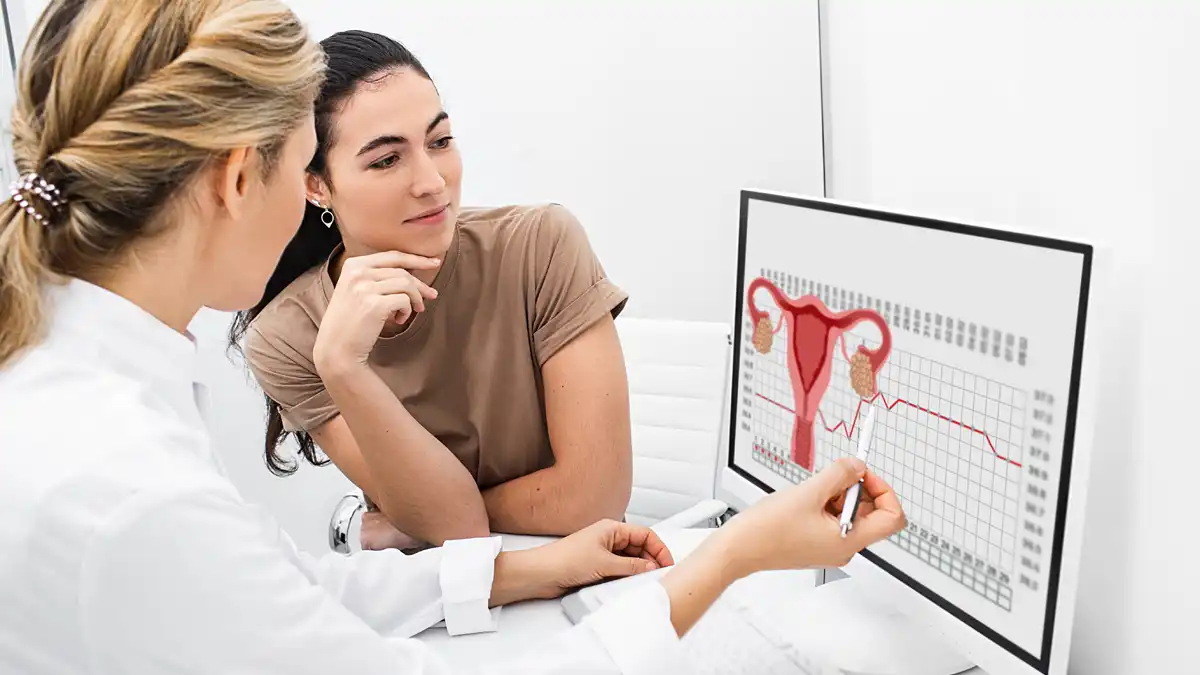Stephanie Boehm turns 60 this summer, and she feels better than she has in years.
Like many women her age, Boehm felt foggy, fatigued and disinterested in sex due to menopause, the body’s reaction to lower hormone levels as women grow older. After consulting with her OB/GYN, she found the right treatment for her.
The Birth of Hormones
Puberty, usually occurring around the early-teen years, signifies the start in production of the sex hormones — estrogen and progesterone — by the ovaries. The process begins with breast bud formation, hair growth and thickening of the uterus.
“Hormones contribute to our increase in height, fat storage and it’s why we start getting those curvy hips,” says Denise Devine, M.D., managing partner with Charleston OB/GYN. “Then, of course, there’s the menstrual cycle.”
The Start of the Period
The National Institutes of Health defines the menstrual cycle as the monthly process in which female hormones stimulate the ovary to release an egg, called ovulation, thicken the lining of the uterus to support pregnancy and shed the lining if there is no pregnancy, which is called menses or menstruation. “With puberty, there is initially irregular ovulation or irregular secretions of estrogen and progesterone,” says John Schnorr, M.D., division director for reproductive endocrinology at MUSC. “But within a year or two, the menstrual cycle becomes more regular.”
If a regular cycle fails to develop, a woman may be prescribed birth control pills, which provide low doses of estrogen and progesterone to regulate the cycle and also alleviate symptoms like nausea, heavy bleeding and cramping. “If they have not had a period by age 16, we have to figure out if there’s something else going on because they need those hormones,” Devine says.
Hormonal Issues
Hormonal issues can affect a woman’s ability to become pregnant, the release of eggs and the preparation of the body for pregnancy. With polycystic ovary syndrome, for instance, a woman’s ovaries produce higher than normal hormone levels. This interferes with ovulation and causes small, fluid-filled sacs in the ovaries to enlarge, and results in side effects like excess hair growth and acne. Polycystic ovary patients can be prescribed medications like Clomiphene (Clomid) or Letrozole to stimulate ovulation.
The Aging Process
As women age and near the end of their sexual cycles, the ovary function weakens. Perimenopause refers to the time when a woman’s hormones are fluctuating, usually in her 40s. “Periods get shorter or longer, and sometimes people skip periods altogether because they’re not ovulating regularly,” Devine says.
The lack of hormone production can spur uncomfortable side effects such as difficulty falling or staying asleep, reduced energy levels, increased fatigue, weight gain and a decreased sex drive. Hot flashes and night sweats, irritability and mood swings may also occur, as can onset or increase in anxiety or depression.
In perimenopause, these symptoms appear during the ovary’s off-months, when it fails to produce enough estrogen. “You start running low on eggs and one month you’ll make an egg and maybe the next month you don’t make an egg,” notes Schnorr. “The ovary’s kind of sputtering along and you start getting some ebbs and flows of estrogen levels that can feel impactful.”
A woman is in menopause when the ovary’s production of hormones — and her cycle — have ended. “You stay in menopause the rest of your life because your body never starts producing those hormones again,” Devine explains.
A woman may also experience early onset of menopause. Having both of her ovaries surgically removed stops hormone production, sending the body into “instant menopause,” Devine says. The surgery may be necessary due to pelvic pain, endometriosis—when endometrial tissue grows outside of the uterus—or if the woman is a carrier of the BRCA gene, which is associated with a high likelihood for developing breast cancer or ovarian cancer. “The younger you are, the worse it is,” Devine explains. “That’s why we’re very particular and cautious about removing the ovaries.”
An Increased Role
Hormones are also involved in other body systems. They promote cardiovascular, brain and bone health, as well as weight control and energy levels. That’s why physicians prefer to have their patients supplement hormone levels as they age.
“Recent data shows the protective effect of hormone therapy and the impact that has on cardiovascular health, osteoporosis, how our fat is distributed and how we feel,” explains Devine, who recommends hormone replacement therapy for women in their 40s. Women who start in their 50s and later experience fewer protections, but the therapy could still help their symptoms.
However, conflicting opinions exist in the medical community, the media and online about the use of hormone replacement therapy for postmenopausal women.
Hormone Therapy
Hormone replacement therapy can alleviate a woman’s experience. A variety of prescription and over-the-counter options exist, including pills, patches, topical and intravaginal creams, pellets and sprays. “There is evidence that if we add back estrogen to your body, we might be able to decrease the hot flashes that you’re having and help you sleep better at night,” Schnorr explains. “And if you sleep better at night, you might have a little bit better mood, less depression and maybe some other things improve along the way.”
Research studies are underway evaluating the effect of hormone replacement on cardiovascular and bone health. “If you are without estrogen for a prolonged period of time, you can have an increased risk of fracture and other problems,” he says.
Feeling Better
After a partial hysterectomy at age 47, with one of her two ovaries removed, Boehm endured intense hot flashes. A prescribed hormone cream failed to provide relief. Despite being active, eating healthy and drinking plenty of water, she still endured symptoms. In December, she tried pellet therapy, which involves the implantation of a rice-grain-sized hormone replacement pellet. “Within two weeks, I could definitely tell a difference in my brain fog and mood, overall feeling of being not as tired and a boosted sex drive,” she says.
The therapy also reduced her night sweats. Symptom management lasted about four months. The medication, not covered by insurance, costs Boehm $400 per treatment. “I break it down to about $100 a month and justify it to myself,” she says. “To feel better and be at the energy level that I prefer, to clear my head and focus on what I’m doing, I feel like I kind of owe that to myself at this stage of the game.”
Boehm didn’t realize just how tired she was before, nor did she notice the extent of her brain fog. “I feel so much better,” she says.
By Linda L. Esterson








